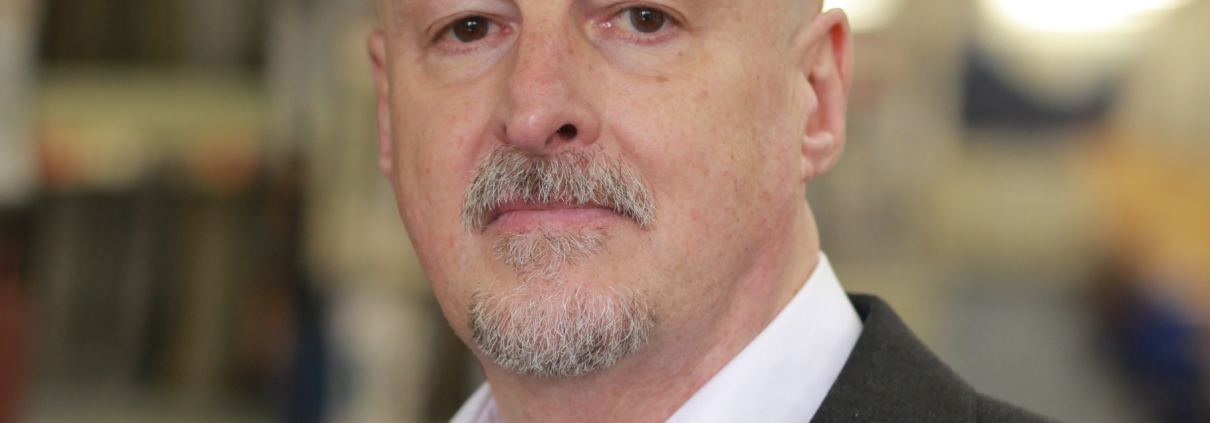We hear about educational privatization a lot these days. My Twitter feed is filled with countless stories about how Betsy DeVos is going to privatize education in America or how Bridge International has privatized education in some African countries. Even the first three episodes of FreshEd way back in 2015 looked at how privatization has gone global.
But do you really know how it’s happening, how privatization as an educational policy is moving around the world? And what effect is it having on governments?
The process of national and local governments enacting policies that advance private interests in education is rather complex and often opaque to the general public. My guest today, Stephen Ball, has written a series of books looking at educational privatization. In his latest book, Edu.net, co-written with Caroline Junemann and Diego Santori, he explores through network ethnography the evolution of the global education policy community that is advancing privatization.
Stephen Ball is a Distinguished Service Professor at the Institute of Education, University College London.
Citation: Ball, Stephen, interview with Will Brehm, FreshEd, 78, podcast audio, June 19, 2017. https://www.freshedpodcast.com/stephenball/
Transcript, translation, and resources:
Will Brehm: 1:39
Stephen Ball, welcome to FreshEd.
Stephen Ball: 1:41
Thank you. I’m pleased to be here. Nice to talk to you.
Will Brehm: 1:44
So you’ve done quite a lot of work lately on global education, policy networks of educational privatization, can you just quickly explain, you know what that means? What does that term mean in your opinion?
Stephen Ball: 1:57
Okay, well, I’ve been involved in a trajectory of work over quite a number of years now, starting from the UK, and then expanding outwards globally. And at the core of that they’ve been, they’ve been a set of books of which we’re talking about the latest one. At the core of that is really a concern about the changing nature of governance. And in relation to that policy, a shift which is taking place in many, indeed, the majority of countries around the world, from traditional bureaucratic, central administrative systems of government towards much more complex, multifaceted, open, diverse, what I call hierarchical systems of governance, which include a whole range of new actors in the work of policy. So one level I’ve been trying to understand that shift, and across that shift, one of the key drivers, and one of the key changes is the move of public services towards either the involvement of the private sector directly by privatization or the involvement of the private sector through contracting out of public sector services. But also in that notion of privatization, I’m including businesses, but also third sector organizations, philanthropies, charities, social enterprises, they’re all getting involved in public sector work. So it’s trying to see that process, monitor it, understand it on a global scale.
Will Brehm: 3:48
So what have you found? I mean, is privatization, key driver of this shift from government to governance, as you’re saying, is privatization, does it look similar, or have similar qualities around the world in your research?
Stephen Ball: 4:01
I should say, it’s a driver and an effect in some ways. It contributes to the process of change. But it’s also an outcome of the process of change. And that’s because increasingly, governments, the state are involved in a process of auto reform, they’re informing themselves, changing the way they work, their modalities and their form. And as part of that, it’s creating spaces and opportunities for privatization. And that has both common elements. So in there are a number of kind of privatization tropes, which are the same everywhere, the same models, so you can privatize by putting a whole service tender and transform it into private form of provision. And that happened in the UK in the 1980s, under Margaret Thatcher. So gas, electricity, the railways, British airlines, British steel, we’re all transformed into private sector services. But as I mentioned earlier, there’s a, there’s another model now, which is contracting out. And that’s the involvement of the private sector in the delivery of services, they remain part of the state, but are actually run and delivered by the private sector. And yes, you can see those in very diverse locations around the world. So in the, but there are variations. So in the book, we concentrate mainly on five countries, or start with five countries, because this is very much a connected-up complex network of relations that stretch across the globe. So we start with India, South Africa, Uganda, Kenya, and Ghana.
And there is a big difference between the African countries and India, India is ready for and enthusiastic about these changes. The Indian state, the Indian government want to engage in, they want to respond to that enthusiastic audience for these sorts of changes. So it’s happening, the shift that I talked about, it’s happening a great speed in India on an enormous scale, or that having said that, there are also differences between Indian states, some states are more enthusiastic than others. So one has to be aware of scales of shift. In Africa, it’s not quite the same, the states in Africa, particularly, say, Ghana, and Uganda, to an extent, are not as enthusiastic for these sorts of changes, not necessarily in any kind of ideological sense, but sometimes more in the sense of the capability of the state for engaging with these sorts of changes. So the extent of penetration of these changes is different there. South Africa is somewhere between. South Africa is clearly moving in this direction, but not at the pace of India. And the South African state, again, is diverse, two provinces in South Africa, are much more enthusiastic than other parts of the country. So it’s the same, but different at the same time.
Will Brehm: 7:22
Right. And so in the Indian case, for example, what is the rationale behind the desire for privatization? Or why are they enthusiastic, as you say?
Stephen Ball: 7:32
I think there are three things happening in India. There is and has been over the last couple of decades a very strong accumulation of criticisms around the state services, there’s now a very well established set of critical positions, which are widely held, widely articulated that for, it’s in the example that we’re looking at that state schools in India, are not as effective as they should be that they have a number of problems.
You mustn’t actually take that at face value. And because it is constructed position, a kind of critique advocacy position, it has some foundation to it, but you mustn’t just take it off the peg as though this is an account of how things actually work. The second factor is that India is the youngest country in the world, it has the largest number of young people between the ages of 15 and 24 of any country in the world. So there’s a huge and increasing demand for education at all levels, which the state can’t respond to, it can’t afford to respond to. It doesn’t have the budget to be able to create in particular, higher education opportunities for that huge number of young people. So there’s this unfilled demand, which is moving through the system. And the third factor, which relates to that is that India is the fastest growing economy in the world, and the Indian government are engaged in a whole raft of initiatives to link up education to the economy, particularly there’s three of them, there’s one called Digital India, there’s Skill India and there’s Startup India and the Indian government see enterprise, the private sector as a key resource in providing these skills and education that are needed for further economic growth. And they also see the methods of enterprise and the dissemination of those methods and sensibilities across the population is key to maintaining this huge, very high level of economic growth. So those factors come together to mean that the state is very receptive to these ideas.
Will Brehm: 9:56
And so in a sense, the privatization offers policies that will solve these problems in India. That’s how some of the policymakers interpret it. Is that, would that be correct?
Stephen Ball: 10:06
Well, that they do. But that is certainly, that is exactly the argument that the advocates makes. So the advocates for change for privatization for the involvement of the private sector in education delivery, made the point during on Bill Gates notion of social capitalism, as he calls it, the argument that the private sector can solve problems that the state has not been able to solve that the private sector is more effective, it’s more efficient, it produces better outcomes, it is more disciplined. And if you bring those things into play, in relation to the public services, you will drive our standards in education or health care, or whatever happens to be. So that’s the key argument that’s being made, that there are a whole set of both global and local advocacy groups, organizations operating in India who present and disseminate that view of change, the necessity for involving the private sector.
Will Brehm: 11:08
So it becomes kind of like the dominant social imaginary of how we view education, the problems of education, and therefore, the solutions of education?
Stephen Ball: 11:16
Exactly (that these), what we’re talking about here is a market in solutions. And there are various organizations, both charitable philanthropic organizations and businesses who say, we have the solution, we know how to make the education system better, if you let us run it, then we can do it better than the way it’s being run at the moment. And that is operating in two ways. One is there’s an enormous growth of private schooling in India, is developing at an incredible speed and pace and that’s responding to demand and the search for privilege by some parents, particularly they want English language education, rather than the indigenous education. They want education that will give their children more direct access to advantaged labor market positions. So there’s a lot of money being flowing into private schooling.
On the other hand, the private sector are also if you like, selling or offering solutions to public sector schools. Digitalization and assessment and other forms of technology in particular seem to be the solutions together with models of public private partnerships where businesses or third sector organizations actually take over the running of state schools. And in the major cities in India, that’s developed quite quickly in Mumbai, Puna, Delhi, Bangalore, Hyderabad, there are now state schools, groups of state schools, which are being run by third party organizations.
Will Brehm: 12:55
And how do these ideas around privatization and in this sort of logic that you’re explaining for the advocates of privatization? How do these policies end up moving kind of globally? So not just in India, because, you know, you mentioned Bill Gates and private companies that are trying to enter the even the public market. So how do some of these policies end up moving globally?
Stephen Ball: 13:19
That’s really the key points of the book. That’s what we’re trying to understand. We’re trying to understand policy mobility, how do these policies get moved around the world? Who does it? What are the mechanisms involved? And when you when you look at that, what you see is the recurrence of some key organizations and keep people joined up in a global network among themselves, and also with related local organizations. So for example, across Africa, and India in different ways, you see Michael and Susan Dell Foundation cropping up in all sorts of areas of activity. They operate in three locations, which are the USA, South Africa and India. And in one sense what they’re doing is exporting ideas from the United States, particularly structural ideas, like the model of charter schooling, which is being translated into these contracted out schools in Mumbai and elsewhere.
And also notions like blended learning, the use of technology in relation to classroom learning, which is linked to forms of assessment and they’re being exported as good ideas as well. So, Michael and Susan Dell Foundation are very, very active in India, they are active in supporting third sector organizations like conscious schools, which is a group of not for profit, social enterprise schools, but also things like impact investing, they invest in educational startup companies. And their model is that they target companies who are addressing the needs of low income urban families and they will provide startup money together with other organizations which enable these companies to develop apps or develop private kindergartens or develop systems of teacher support curriculum development, which are then sold to both the public and the private sector. So they, for example, they are one example of an organization with global reach who, through their networks and through their activities in South Africa, and in India, relocate these ideas together with local partners into the new context. So in India, they work very closely with a whole range of organizations. But one example would be the Central Square Foundation, which is a venture philanthropy run by a very influential Indian entrepreneur turned venture philanthropist Ashish Dhawan and one of their many relationships is an organization called the Education Alliance. And that’s committed to advocating public private partnerships as a solution to educational problems.
So there’s one example in the book, we look at other examples, we look at the work of Pearson, Pearson Education, in particular, the Pearson Affordable Learning Fund, which invests in again, education startups and low cost private schools in Africa and in India. We looked at IDP Rising Schools, which is a micro-financed organization based in Chicago that’s providing micro finance support for private schools in Ghana. So these are organizations, businesses, foundations that have links and relationships across the globe. And through those links, and partners and initiatives and programs, they are able to move what they see as ideas about good education and solution to education problems around the globe.
Will Brehm: 17:06
So I can see how a lot of, you know, this shift from government to governance in these examples that you’re giving with the Dell Foundation and linking up with local partners. And these ideas are able to spread globally. But can you talk a little bit about, you know, what is the role of the nation-state here, and what is the role of national policy-makers, because obviously, they’re not going away. It’s not like they’re, we’re not losing government, that it’s just taking on a new role. I would imagine.
Stephen Ball: 17:36
That’s right. That’s exactly right. It’s not a loss of governing capacity, it’s a change in the way governing takes place. So rather than governing through central mechanisms, which are organized and delivered through bureaucratic administrative systems at the national and local level, this now is in effect evolving or contracting out that those activities to third party organizations, foundations or businesses. So the state remains key in this. But it begins to operate in a different way. So that the state in this, at one level, it’s displaced by the market in that it withdraws increasingly from the direct delivery of services. But in another sense, it’s actually key to the market in terms of creating the conditions in which market forces can operate in the private sector, or the third sector can operate. So it’s changing, reworking the boundaries between the economy in the state. Things that we’re seeing previously, as exclusively the business of the state are now being seen as things that can be done by other organizations, either independently, or, as I said before, on contract the state. And what the state does is create the possibilities for a market to develop, in part by becoming a purchaser, a commissioner of services, but also alongside that, a monitor, a regulator, a target setter. So the state at least in relation to public sector services, is able to make demands, create expectations about what it wants from these providers, obviously, that’s more difficult in relation to privately run, entirely privately run provision. But nonetheless, there are in each of these states systems of regulation, which are more or less effective, which frame the provision of schooling by private companies.
The question is how that works in practice, there is a lot of issues in India, about how well the regulations for the delivery of schooling are enforced, you know, issues about whether children have space in which to play, how much space there is in the classroom for each child, the curriculum has been delivered, the extent to which the state can actually develop some monitoring infrastructure in relation to those things, remains problematic. But nonetheless, that the state is a key market maker in all of this, if the state doesn’t change, then very little is possible. So if you look at Ghana compared with India, the Ghanaian state is fairly slow moving, I hesitate to say ineffective but it’s not a very effective state. And in that sense, it’s not creating a lot of opportunities for these other forms of delivery, and activity.
Will Brehm: 20:47
So are some of these global actors in this network, kind of pushing these different ideas in these different national contexts? Are they aware of how they are changing the state or in their intent to change the state to be market makers and be kind of conducive to the growth of privatization? Like, are they actually aware of that, or is that just kind of happening unknown to them?
Stephen Ball: 21:15
Many of the larger global organizations are increasingly aware, self-conscious about that. If you look on the Michael and Susan Dell Foundation website, they talk about being in the business of system transformation, huge, kind of, claim and ambition they make. They want to change education systems, and they talk about themselves as being disruptive. So they want to disrupt taken for granted models of education, okay, so they are and if you look at Pearson, private company, they now see themselves as a policy actor, they don’t see themselves as having an indirect relationships with the state. They see themselves as part of the policy making process. And they talk about themselves on their website as part of a global consensus, and contributing to a global consensus about education, education policy. And of course, the consensus is one that clearly relates to their interests. But they’ve rebranded themselves Pearson, and now it’s a social purpose company, they don’t present themselves as a business, but they talk about themselves on their website, fascinating thing to look at their website, social purpose company that is contributing to the improvement of the learning of young people around the world. The whole issue about business and profit and stock, shareholders is kind of receded into the background.
And now this is all about as Bill Gates and others presented the idea of doing well, by doing good making money out of bringing about positive social change, which is the basis of impact investing. So the argument is you can actually make money and profits, but at the same time, you can serve social purposes. So, yes, they do that there is a consciousness of this, if you look at the Central Square Foundation I mentioned earlier, they are actively involved in trying to change the way the state operates. And increasingly, the representatives of these organizations and others, like Boston Consulting Group, ARCH, which is a British financially based charity, absolute return for kids, they are engaged in policy conversations with government, they are writing reports, they are doing evaluations, they are giving advice, they’re providing solutions for government. So these are now not second order relationships. These are direct involvements in the work of the state in state work.
Will Brehm: 23:52
And even though they have pushed the profit motive maybe in the background, I mean, do you think that’s still the main reason these private entities are involved?
Stephen Ball: 24:02
Certainly that the businesses per se, there is a clear relationship to the issue of profit. If you look at Pearson again, Pearson is the largest education business in the world. It has an annual turnover of over 5 billion pounds sterling a year. It’s massive, it is the biggest operates across the world, in almost every country. They now have one of the areas of their activity partly through the Pearson Affordable Learning fund is to address what is called the bottom of the pyramid. That is the idea that poor people still have money that they are willing to spend on things like education, and particularly in areas like technology, the technology market on the whole is very highly saturated and low income families are relatively untapped market for technology. So businesses like Pearson and companies like Dell, I should make the point that the Dell corporation is a separate entity from the Michael and Susan Dell Foundation. But both headed by Michael Dell. There’s clearly an enormous interest in particularly selling technology of various kinds to these low income families to the bottom of the pyramid. So this is capital seeking new markets, restless capitalists, as Marx called it, they see exactly what’s happening, seeking out these new markets, seeking out near as a new area of profit. So as the bottom of the pyramid is one area, the other area is the state if the state’s paying our contracts, states are normally very dependable, they are good players, they are reliable on good flows of income. So that’s another source of income. And if you can do state work, if you can also do policy work, as well as delivering services, billions of dollars around the world are now spent by governments on education and other policy activities, which are paid to in particular to the four big management consulting companies PricewaterhouseCoopers, Ernst and Young, Accenture and KPMG. Most of us have no idea how much our governments pay to these companies to run the country in various ways.
So yes, profit is everywhere. And one of the things in the book, one of the themes in the book and one of the chapters is called “Follow the money”. So this, the networking analysis, we do in part is grounded in the flows of money. Who has it? Who do they give it to? What are they invested in? What profits there are to be earned? What startups are being supported? So one of the arguments we’re trying to make in terms of policy analysis is that it’s all very good talking about ideas and models and policy processes, and new forms of policy relationships, we also need to follow the money, we also need to read the financial pages, we need to look at the stocks and shares, we need to understand the operation of financial, global financial markets, if we’re going to do global policy analysis, that has to be part of our framework.
Will Brehm: 27:33
Call me a cynic. But I am very skeptical of these, you know, these for profit businesses using the discourse of doing good and helping society and, you know, bringing better education to children, but at the same time that the underside of that is that there are, they are trying to get to that bottom pyramid and get the state to pay for educational services. And so I don’t know, it just makes me very nervous to kind of see this discourse that could you know, like, how could you disagree with giving children better education, I mean, I don’t think you can, but at the same time, when it’s you know, it’s covering or veiling the for profit motive, I get very skeptical.
Stephen Ball: 28:21
You’re right. It’s very difficult to say, okay, all these are bad things, terrible things are happening because people are making profits out of education, or whatever if we can see some positive effects. And clearly, there are some positive effects. But I think we also have to suspend judgment about that, to some extent, there are clearly some examples of bad practice what one British Prime Minister once called the unacceptable face of capitalism. Capitalism is not essentially a benign force. And the bottom line for particularly public companies is their share price, their profitability, their primary responsibility is to their shareholders, not to their client. And when that comes into play, when profits are being made, when the business is running well, then fine, things may operate very smoothly. But when there are difficult financial situations, then that can mean that decisions are made in the interests of shareholders, rather than the interest of the state or the interest of children.
An example, recently in Sweden, the Swedish education system allows for private companies to run state schools on contract paid per pupil by the government. And about 20% of Swedish school students attend such schools, independent schools, still part of the public sector, but run by private companies. And this was initially seen and some extent was very profitable for these private sector companies. And a group of about five quite large companies took up the running of most of these schools. And one of them, the largest one, John Bauer was in 2009, bought by a Danish private equity company called Axcel, whose previous investments were mainly in the areas of housing, fashion and pet food, but they thought this would be a good addition to their portfolio for their private investors. 2014 financially things have changed a bit, Axcel no longer saw delivery of schooling as an area of profitability. And in February 2014 announced they were closing all the John Bauer schools as of that year, 36 schools. So suddenly, the Swedish government were confronted with 36 of their schools, several tens of thousands of students who might have no school at all. But this was another country, a Danish company, private equity company, making decisions about profitability, which nonetheless had enormous implications for state schooling in Sweden and the state, the Swedish state had little or no ability to influence the decision making of this company. That’s a stark example. But it does demonstrate when the issues that can arise when the bottom line comes into play.
And it’s also the case that the more the private sector gets involved, then the more opaque some issues about both decision making and outcomes and effects become. The key example here perhaps, is what is and we talked about this in the book that would the world’s largest private school company Bridge International Academies. They now have over 400 schools, mainly in Kenya. But they did have schools in Uganda, they’re opening schools in Nigeria, and in two states in India. They monitor the performance of their children in their schools very carefully, that all the teaching and learning done through apps that children do tests each day, or after each lesson that the data is fed back to Boston. And analysis is done. And this is used as a kind of data analytics to feed back to the schools. But all of that data is produced and controlled by Bridge. So all that we know about the performance of Bridge schools is what Bridge tells us about the performance of Bridge schools, so that there are issues like that which come into play as well, which is whose data we’re talking about? How do we know that these outcomes are effective? What are the other issues around? Who it is that attend these schools? Are they comparable with the local state schools because Bridge do make comparisons with what they say, or equivalent state schools in their locality. But all of that is done in-house. So there are whole range of issues that you need to think about in relation to these things.
Will Brehm: 32:56
And in your work, have you uncovered or have you found any networks that are pushing counter narratives, you know, education and how it should be done?
Stephen Ball: 33:08
I think that’s an omission in the book, we do acknowledge, at the beginning of the book that we’re looking at the, if you like, the pro-market networks, I mean, what’s interesting and perhaps not surprising, if you look at the networks themselves, and there are a lot of, they’re both some big network pictures in the book which are difficult to read, but then we break those down into smaller sub sections. So you can look at those. Is the absence of both some of the usual suspects? So they’re not all that much participation from multilaterals, some World Bank appears a little bit but some of the OECD a little bit and not very much. But what is distinctly absence are the more, if you like, progressive NGOs that are operating with somewhat different models of development or models of practice. So we don’t look at those, partly because they are absent. We do know in passing that in relation to Bridge I, a group of around 40 NGOs, of different kinds have created an alliance which has developed a critique of Bridge and its practices related to questions about human rights and have been very effective, particularly in convincing the Ugandan government to stop allowing Bridge to run schools, and also have been putting pressure on the Kenyan government to do the same. And two counties in Kenya have actually stopped the Bridge from running schools. So there is a counter movement. And they do articulate a different, I suppose, more traditional welfare public sector model of schooling, although some of them are arguing for more radical models, like cooperative models, community models of schooling, but the alternatives are not that well articulate.
Will Brehm: 35:01
And don’t necessarily have the same global network?
Stephen Ball: 35:04
They have a network, but basically, they are often talking to themselves. So they meet together, they communicate together, they send out press releases, make due reports, but very often it’s difficult for them to get into these policy networks. I mean, the same thing applies that looking at these networks of private philanthropic provision, they are very inward looking, there is a discourse, which is very well set. And basically, to join, you have to sign up to the discourse because otherwise, people don’t recognize what you’re saying, you have to be able to speak the language of the network, you have to be able to recognize the basic assumptions of the network. So again, they’re very much talking to themselves, but they have a lot more money available and in many ways, a lot more influence through relationships to government speaking at the World Economic Forum, the Wise Education Summit, and other major events where they are talking directly to national international policymakers, the NGOs don’t get the same opportunities to do that.
Will Brehm: 36:22
Well it’s just a very fascinating look at privatization and what it’s doing inside schools and how this policy is moving around the world. So Stephen Ball, thank you so much for joining FreshEd it was really great to talk today.
Stephen Ball: 36:36
Nice to invite me and I enjoy talking to you. Nice to meet you.
Exploring educational privatization









